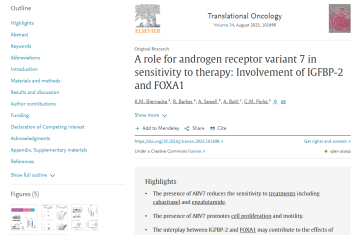Androgen receptor variant 7 and protein interaction in prostate cancer progression
- 14 June 2023
Interactions between androgen receptor variant 7 (ARV7), the forkhead box protein A1 (FOXA1) and insulin-like growth factor-2 (IGFBP-2) could potentially contribute to a more aggressive form of prostate cancer developing, according to research published in Translational Oncology. Researchers found positive associations between ARV7 and the two proteins in tissue from patients with prostate cancer.
Prostate cancer is one of the leading causes of cancer-related deaths in men. Localised prostate cancer – cancer that is limited to the prostate – can be treated effectively, but most patients go on to develop a more aggressive form of the disease.
Male sex hormones such as testosterone play in important role in the growth and function of the prostate. These hormones are also called androgens and they form links with androgen receptors. In turn, androgen receptors are involved in prostate cancer development and progression.
The study team wanted to explore the role of ARV7 – an androgen receptor variant – in prostate cancer progression. ARV7 is created during a process called alternative splicing, where different proteins with distinct structures and functions can be produced from a single gene.
Researchers analysed tissue samples and prostate cancer cells and found those with ARV7 showed an increased rate of cell division, proliferation and motility. They also confirmed that ARV7-positive prostate cancer cells were less sensitive to certain types of anti-cancer treatment. It is therefore possible that targeting this variant may go some way to helping with treatment resistance.
In addition to the androgen receptor, other key molecules also play a part in the development of prostate cancer. For example, circulating IGFBP-2 increases in patients with prostate cancer and positively correlates with how aggressive a cancer is. FOXA1 is seen as a gene with the potential to cause cancer and is involved, for example, in promoting the proliferation and migration of prostate cancer cells.
The study team demonstrated that decreasing ARV7 expression was associated with a decrease in IGFBP-2 and FOXA1. They confirmed this by analysing prostate cancer tissue samples and performing a correlation analysis which showed significant positive associations between ARV7 and IGFBP-2 or FOXA1. This association was not present with the androgen receptor.
Dr Kalina Biernacka, lead author, said:
“Given the fact that our tissue samples predominantly represent localised medium grade prostate cancer, we speculate that a cohort of more aggressive cancer would strengthen the associations we found.
“A recent study found a positive correlation with ARV7 and B7-H3, an immune checkpoint molecule, overexpressed in prostate cancer that associates with poor cancer prognosis. Together with our study it leads to the overall indication that ARV7 promotes oncogenic behaviour and clearly suggests the importance of AR signalling in the transition to a more aggressive phenotype.
“Our data may contribute to the complex mechanism underlying ARV7-mediated increases in proliferation and motility in prostate cancer cells, suggesting roles for FOXA1 and IGFBP-2 in the presence of ARV7.”
